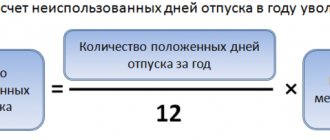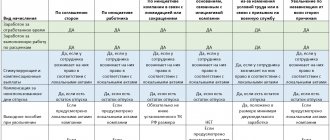The legislation of the Russian Federation provides for the conclusion of employment agreements for an unlimited period of time, as well as indicating the exact date of its completion (58 Art. Labor Code).
Article 59 of the Labor Code of the Russian Federation considers when and under what conditions it is possible to conclude a fixed-term contract.
When concluding a fixed-term employment agreement, the expiration date and the reasons why an open-ended contract cannot be concluded must be indicated.
In any case, a fixed-term contract is concluded for a period of no more than five years, although it can be extended after a specified period of time.
Such employment agreements are usually concluded:
- when the very nature of the work performed determines its seasonal necessity (for example, harvesting, or the heating season);
- if a permanent employee is absent for a long time (due to illness or maternity leave);
- for the duration of work that requires a short period of time (50 – 60 days);
- if the enterprise is initially created to complete a given task for a certain time period;
- for internships and training in professional skills;
- in place of an employee working on a permanent basis if he was elected to an elective position for a certain period of time;
- when they are sent from employment centers to find temporary work of a public nature;
- when sending persons who, due to their convictions, do not have the opportunity to serve in the ranks of the country's armed forces, to alternative civilian service.
It happens that some employers prefer to enter into fixed-term contracts, believing that in this case the employee is not entitled to any benefits upon dismissal.
This opinion is erroneous, since when terminating such a contract, the employee has the same rights and guarantees as when dismissing an employee hired for a permanent job.
A concluded fixed-term contract without specifying specific terms and circumstances that served as the basis for its conclusion is considered to have an indefinite period, that is, unlimited.
A fixed-term contract can be drawn up by agreement between the employer and the party being hired in the following cases provided for by the Labor Code:
- if an individual goes to work for an entrepreneur where the number of employees is no more than thirty-five people;
- when a person has reached retirement age or, according to the conclusions of medical commissions, has the right to work only temporarily;
- work in an organization located in the Far North or areas that are equivalent in their climatic conditions, if it is necessary to move from a permanent place of residence;
- work is organized to prevent the consequences of emergency situations, such as disasters, accidents, accidents;
- with full-time students;
- persons employed part-time,
and other cases provided for in the second part of Art. Art. 58, 59 Labor Code of the Russian Federation.
Upon termination of an employment contract concluded for a certain period, compensation payments are offered under labor legislation and determined by the norms of Chapter 27 of the Labor Code of the Russian Federation.
In the event of an upcoming staff reduction or liquidation of the enterprise, the owner must pay the dismissed employee, if there is no vacancy for transfer to another place of work, severance pay in the amount of average monthly earnings.
Similarly, a dismissed employee working under an open-ended contract must be provided with up to three months of guaranteed benefits in the amount of earnings if the dismissed person registered with the territorial employment center within two weeks, but was not provided with a suitable job.
When concluding an employment contract, the employment contract may stipulate other cases of payment of compensation under various conditions of termination of the agreement.
Example #1
- We count how many months a person worked: 1 – from September 10 to October 9, 2 – from October 10 to October 31 (22 days are rounded up to one). The total is 2.
- We multiply by two and get that Gavrilov A.L. must receive money for 4 days of accumulated vacation.
- For leave upon dismissal Gavrilov A.L. will receive 4,651.16 rubles (1,162.79 rubles/day * 4 days).
Condition No. 2: the contract period is more than 2 months.
Important! If the term of the employment relationship under the contract is more than two months, then upon dismissal, compensation for unused vacation is calculated in the same way as under an open-ended contract.
Expert opinion
Kuzmin Ivan Timofeevich
Legal consultant with 6 years of experience. Specializes in the field of civil law. Member of the Bar Association.
In order to determine the amount of cash payment, we multiply the average daily earnings by the number of days of unused vacation.
Each working employee is entitled to at least 28 calendar days of vacation per year. For less than a year, we reduce this amount in proportion to the time worked.
In order to calculate the average income per day, they look at the total salary for the last 12 months. In a situation where a person terminates employment on a date other than the last day of the month, that month is excluded. The length of one month is taken to be 29.3 days.
Situation 3
Between Berdnikov A.V. and the Tsvet organization concluded a fixed-term employment contract to perform welding work in Norilsk. The contract period was 8 months from February 1, 2016. The employee's salary was 121,254 rubles per month.
Since the duration of the employment contract is more than two months, and they are not related to seasonal work, the calculation of the amount of vacation and vacation pay will occur according to standard formulas.
To determine vacation pay, you will need the following data:
Total salary for the billing period:
121,254 rubles per month × 8 months of validity of the agreement = 970,032 rubles.
Duration of labor relations in days, where 29.3 is the average monthly number of days:
29.3 ×number of months of work = 29.3 × 8 months = 234.4 days
Average daily earnings:
(Total salary)/(Average contract duration in days) = 970,032/234.4 = 4,138.4 rubles per day
Since Berdnikov worked for less than a year, the duration of his vacation will be:
(28 cal days)/(12 months)×8 months of work=18.7
Additional paid leave provided to workers in the Far North under Art. 321 of the Labor Code of the Russian Federation, is 24 calendar days.
Based on this, the following calculation can be made:
(24 cal days)/(12 months)×8 months of work=16 days of additional rest
Berdnikov will receive vacation pay for his annual main vacation:
19 (rounded) days ×4,138.4=78,629.6 rubles
Vacation pay for additional leave will be:
16 days of additional rest ×4,138.4=66,214.4 rubles
The total amount of vacation pay will be:
78,629.6+66,214.4=144,844 rub.
Labor legislation does not prohibit combining several vacations into one period or dividing them into several parts, however, in the case of a temporary employment contract, it is recommended to either go on vacation immediately before its end or receive compensation. In any case, vacation pay will be paid.
Grounds for termination of a fixed-term contract
The reasons why relations under a fixed-term contract are terminated are listed in Art. 79 Labor Code of the Russian Federation. Among them:
- expiration date;
- completion of the work for which he was contracted;
- exit of the main employee;
- completion of the period when concluding a contract for seasonal work;
- at the employee's own request.
The employer must notify the employee that the contract term is coming to an end three days before dismissal. By mutual agreement, the parties may terminate the contract at any time.
If the production process requires the constant presence of a person at the workplace, then you need to look for a replacement for the temporarily absent employee. When the staffing level is restored, the conscript is fired.
At the same time, during his substitution, he may accumulate unused vacation. You need to understand how compensation for unused vacation under a fixed-term employment contract is drawn up, calculated and paid.
conclusions
When terminating a fixed-term employment contract, the employee must be paid compensation for unpaid vacation. The calculation of this payment will depend on whether the temporary employee receives vacation in working days or calendar days.
If the contract period is up to 2 months, or the person is hired for the duration of the season, then the calculation is carried out according to clause 11 of Regulation No. 922.
If the contract term is more than 2 months, then the calculation is carried out according to standard rules, as for open-ended employment contracts, based on clause 10 of Regulation No. 922.
Are conscripts paid compensation for unused vacation?
Often employers hire employees for a certain period of time. The reasons for this may be different.
For example, the main subordinate goes on maternity leave, long vacation or sick leave. When the time comes to dismiss a temporary employee, then the question arises about compensation for unused vacation under a fixed-term employment contract.
It is important for an employer to follow the provisions of current legislation and not violate the rights of its subordinates. Article No. 37 of the Russian Constitution states that every citizen working under an employment contract has the right to annual paid leave.
Its minimum duration is 28 calendar days. For this period, the place and position, as well as the average salary, are maintained. This is stated in Article No. 114 of the Labor Code of Russia. Upon dismissal, all employees are paid monetary compensation for unused vacation days. This requirement is enshrined in Article No. 127 of the Labor Code of Russia.
Compensation for conscripts upon dismissal is provided for all paid leave, basic and additional. The employer's refusal to compensate them is considered a violation of the labor rights of the subordinate and is subject to punishment. Article No. 140 of the Labor Code of the Russian Federation defines the terms for payment of compensation upon dismissal.
Full financial settlement with the employee is carried out on the day of actual termination of the employment contract. If the deadlines established by law are violated, then management must pay all amounts due to the subordinate with interest. This is stated in article No. 236 of the Labor Code of Russia.
Compensation transfer time
In the process of calculating the required monetary compensation, the following rules are observed:
- If a person leaves under a fixed-term agreement while on vacation, the date of official termination of the agreement will be the last day of the vacation.
- In certain cases, an employee can receive the necessary amounts on the day the salary is transferred to all employees.
- If for a certain reason an employee is not able to receive compensation on the day of termination of the contract, it must be provided on a different day. The main thing is that the amount is transferred upon request.
Important! On all the points listed above, the employee must consult with the head of the organization.
Such negotiations and warnings will help avoid misunderstandings between the two parties to the labor relationship. If this important condition is met, difficulties can arise only when discussing and calculating the due amount.
Expert opinion
If the recipient or manager is not satisfied with the amount of compensation, an amount that is not subject to dispute is issued to the hands or account. The rest is recalculated and only after that the payment is made.
Head of the HR Department, OUST-AGRO LLC, Semenov Viktor Alekseevich.
How to receive upon termination of an employment contract?
To receive monetary compensation for days of unused vacation upon expiration of the validity period or early termination of a fixed-term employment contract, the subordinate does not need to take any measures.
The dismissal itself is a reason for the employer to pay all amounts of financial resources due to the citizen under the law, including due compensation.
Expert opinion
Kuzmin Ivan Timofeevich
Legal consultant with 6 years of experience. Specializes in the field of civil law. Member of the Bar Association.
The head of the company must issue an order to terminate the employment contract with the fixed-term employee. The order specifies a clause on payment to the employee of compensation for unused vacation days, as well as other amounts due to him.
It must be taken into account that the conscript receives less than what was initially awarded. This is due to the deduction of personal income tax. If a citizen has not received compensation on the day of dismissal, then he should contact his employer with a demand for payment of funds.
It is necessary to refer to the provisions of the current legislation that the manager violates. If this does not help, then you need to file a complaint with the Labor Inspectorate. The next authority is the prosecutor's office and the court.
It is important not to remain silent about the conflict that has arisen, but to try to achieve justice. When going to court, it will be possible to demand that the employer compensate not only the unused vacation period, but also the moral damage caused.
How to calculate correctly?
If there are no difficulties in determining the amount of compensation for unused vacation upon dismissal of employees with whom an employment contract was concluded for an unlimited time, then a number of questions arise in relation to conscripts. Making errors in calculations entails a number of problems.
If a greater amount of money is paid than is due to a subordinate, the company will incur unnecessary losses. If less is accrued than necessary, the employer may be brought to administrative or criminal (if a deliberate violation of the law is revealed) liability. Therefore, you need to know how to carry out the calculation correctly.
The general procedure consists of the following steps:
- determination of the billing period and duration of vacation;
- summing up the income received by the employee, from which insurance premiums were paid and which relate to the remuneration system. These are advance payments, allowances and additional payments, salaries, rewards and bonuses. A complete list of what should be taken into account is given in Regulation of the Government of Russia No. 922 dated December 24, 2007;
- determination of average salary. The total income is divided by the number of days in the billing period;
- determining the amount of compensation. Multiply the length of vacation by the daily income.
Calculating the amount of money as vacation compensation for a temporary employee has a number of features. Much depends on how long the subordinate was hired as a member of the company.
Contract for a period of less than 2 months
This is stated in paragraph 35 of the Rules approved by the CNT of the USSR on April 30, 1930, No. 169. If a citizen has worked more than 15 but less than 60 days, then he will be entitled to compensation for unused vacation under a fixed-term employment contract. Company managers need to take this point into account.
After all, it will not be easy to return the money paid to a former subordinate. If the contract was concluded for a period of two months or less, then upon dismissal, unused vacation is compensated at the rate of two days per month of work.
This is stated in article No. 291 of the Labor Code of Russia. The same rule applies to seasonal workers (Article No. 295 of the Labor Code of the Russian Federation). According to this requirement, the subordinate will have to pay a minimum of 2, maximum of 4 days.
When determining the duration of vacation, you should adhere to the standard rules. First, you need to calculate the number of months actually worked by the person from the date of employment.
If there are exactly two of them, then the conscript will need to compensate for four days. If a citizen worked less, then the rounding rule is followed.
If 15 days or more are worked in a month, then it is taken as a full month; fewer days are not taken into account. In the first case, the conscript will be paid 4 days, and in the second - 2 days of vacation in the amount of average earnings.
Algorithm for calculating compensation upon dismissal:
- Pavlov V.S. worked from January 3 to February 14, 2021 according to the calendar for 31 days;
- the average daily salary is 55000_31=1774.19 rubles;
- will have to pay Pavlov V.S. upon dismissal, compensation in the amount of 1774.19 x 2 = 3548.38 rubles.
Algorithm for calculating the amount of compensation for unused vacation:
- The citizen worked for 1 month and three weeks. He is entitled to four days of leave;
- in fact Sidorov A.A. went to work for 35 days;
- average daily income is 63000_35=1800 rubles;
- must pay Sidorov A.A. 1800x4=7200 rubles.
Wage
Salary refers to mandatory payments that an employee must receive. Its size is determined taking into account the actual time worked before dismissal in accordance with Art. 139 Labor Code of the Russian Federation.
For example, in March, sales manager Ekaterina received 15,000 rubles as a salary, having worked for 20 days. To calculate payment for 1 day, 15,000 / 20 = 750 rubles are required. Before being fired, Ekaterina managed to work 10 days. To calculate the final amount that will need to be paid to Ekaterina upon dismissal as wages, 750 * 10 = 7,500 rubles are required.
Contract for 2 months or more
If a fixed-term contract is concluded for more than two months, then compensation for unused vacation is paid in the same way as in the case of a subordinate hired for an unlimited time. According to the law, the right to release from work arises six months after employment.
In this case, vacation in full is provided only after a year. If a person quits earlier, then compensation is calculated for unused days of release from work, calculated in proportion to the time worked.
Algorithm for calculating compensation payments to Valerieva A.S.:
- the woman worked for a year and 16 days. She is entitled to leave of 28+2.33=30 days;
- the employee must be paid 1194.54x30=35836.2 rubles.
Thus, upon dismissal, conscripts are entitled to compensation for unused vacation if they have worked for more than 15 days from the date of registration as a member of the company. It is paid taking into account a number of rules established by current legislation.
If a citizen has worked for less than two months, then he is compensated for 2-4 days of vacation. If the contract was concluded for a longer period, then the proportionate approach applies.
At every enterprise, it happens that the main employee temporarily leaves the workplace. The reasons may be different - a long business trip, maternity leave, complex illness, annual or extraordinary leave.
During these periods, the law prohibits employers from depriving a permanent employee of his position and workplace, but the absence of an employee is fraught with problems for the enterprise, including stopping operations. Therefore, the legislator provides for the possibility of hiring temporary workers, in respect of whom, despite short-term cooperation, the employer is also obliged to comply with the norms of the Labor Code of the Russian Federation.
Thus, the list of payments includes compensation for temporary workers upon dismissal, which not everyone knows about.
Payments upon dismissal of employees, regulated by the Labor Code of the Russian Federation
Important! An employee has the legal right to defend his rights and interests in court, including in cases where the employer incorrectly calculated dismissal payments or deliberately reduced their amount.
The provisions of the Labor Code give accountants a clear idea of what payments must be made to an employee at the time of dismissal from work, and how to correctly calculate the amount of such payments. The instructions of the Labor Code of the Russian Federation apply to all cases of termination of employment contracts, regardless of the characteristics of employment and the form of ownership of the company .
An employee, including a temporary one, may claim the following amounts on the day of leaving work:
| No. | Payment on the day of dismissal | Additional information |
| 1 | Salary | For the billing period that preceded the dismissal |
| 2 | Bonuses, additional payments and salary increases | And other material incentives (regular), which are fixed in the employer’s remuneration system (specified in the collective agreement) |
| 3 | Compensation for unused days of annual leave | It happens that an employee not only does not receive compensation, but also a certain amount is deducted from his salary to account for the vacation days that he used “in advance.” |
| 4 | Compensation for unpaid sick days (period of incapacity for work) | If any days of sick leave were not paid on time, the employer is obliged to pay the debt within 10 calendar days after the actual day the employee left work |
Entitled payments
Upon termination of an employment relationship with an employee, a full settlement must be made; he must be given a work book, a certificate of income and the required amount of money, which includes:
- severance pay;
- vacation compensation;
- wages.
Payments to the employee must be made on the last working day. The due amount can be received by a person personally at the company’s cash desk or transferred to a personal account. In the second case, the transfer of funds must be made the next day after the employee’s request.
It is important to know! If an employee resigns while on vacation or immediately after taking it, the date of termination of the employment relationship will be considered the last day of vacation.
In some cases, an employee may receive all payments due to him on payday. This request must be fully discussed with the supervisor in advance.
If for some reason a person refuses to collect money on his last day at work, then it must be provided to him on another day upon request.
If disputes arise regarding the amount of payments, the manager is obliged to pay the former subordinate the amount that is not subject to dispute. The remaining portion is transferred to the employee after a complete check and recalculation.
Sample of filling out a pay slip - front side Sample of filling out a pay slip - back side
Is temporary workers entitled to compensation upon dismissal against unused vacation?
Important! If a temporary employee has worked for the company for 6 months or more, the employer is obliged to provide for him a full list of payments (including compensation) that are due to permanent employees upon dismissal from work.
Thus, together with the remaining wages and, in some cases, severance pay, a temporary employee upon leaving work is paid compensation for unused vacation (vacation pay that was not received due to the fact that the employee never went on annual paid leave).
In order to correctly calculate the payments due to a temporary employee, the accounting department must have the following information:
- The total length of service of the subordinate in the company in which he currently works (the procedure and rules for calculating the length of service giving the right to leave are given in parts 1 and 2 of Article 121 of the Labor Code of the Russian Federation).
- The number and duration of periods that are excluded from the total length of service at the company (if any).
- The number of days that are not included in the total length of service, but must be taken into account for the purpose of providing paid annual leave.
- The total number of rest days that have “accumulated” during the current period that have not been used by the temporary worker.
- The number of days of the next vacation that were used by temporary staff “in advance” (before the right to rest arises) - payment for such days should be excluded from the final amount of compensation for unused vacation.
When calculating the amount of compensation for unused days of annual paid leave, the following points are taken into account:
| No. | Information that must be taken into account when calculating compensation | Additional information |
| 1 | Number of vacation days per 1 month of work at the enterprise | The company's permanent employees earn 2.33 days of annual leave for every month they work for the company. As for temporary employees, the number of days of paid leave per 30 days worked depends on the total duration of work at the enterprise:
Expert opinion Legal consultant with 6 years of experience. Specializes in the field of civil law. Member of the Bar Association. ○ it will be counted as fully worked if the employee appeared at the workplace for 15 or more days (in February - 14 days) of this month (worked for more than half the month); ○ it will not be taken into account at all if the employee worked less than 15 days.
|
| 2 | Annual leave days spent | When calculating the number of months worked at the company for the purpose of paying compensation for unused vacation, non-calendar months are taken into account - the countdown begins from the moment the temporary employee is hired. If an employee managed to use several days of his allotted vacation, the “cost” of these days is excluded from the compensation amount. |
| 3 | Inclusion in the total length of service at the enterprise of periods during which no activity was carried out, but which must be taken into account | The length of service must include certain periods of time during which the temporary employee was not in the workplace. These periods include those during which the employee received average daily earnings: ● production downtime through no fault of the employee, ● forced absences due to the fault of the employer, ● extraordinary unpaid leaves (no more than 14 days per 1 working year). |
Holiday pay for seasonal workers
All employees can receive compensation by signing up for a fixed-term contract. In such a case, they work for a period of 2 to 6 months. According to the rules prescribed by law, each month is entitled to two days of vacation . It is usually granted after hours worked, followed by dismissal.
To make it clear how vacation is compensated or provided, it is worth considering an example. The employee was hired during the harvest period from 08/01/2018 to 11/01/2018. Accordingly, on November 1, the manager must provide the following:
- Rest time of 6 days and subsequent dismissal;
- If the employee did not go on vacation of his own free will or due to a large amount of work, he will receive compensation for these 6 days.
6 working days will be paid based on a six-day week. All days except Sunday. Also, non-working days and holidays are not taken into account, as stated in Art. 120 TK. In other words, when paying compensation under a fixed-term contract, rules similar to those for paying vacation time in a regular form of employment are used.
Procedure for applying for vacation compensation for a fixed-term employment contract
Employment contracts are one of the most important documents between an employee and an employer. There are several types of contracts:
1. Fixed-term contracts - concluded for a certain period, but not more than five years; if neither party expresses a desire to terminate it and the employee continues to work, it automatically becomes unlimited
2. Perpetual – contracts that do not have a specific period of validity
The procedure for providing compensation is the same for both a fixed-term and an open-ended employment contract, namely:
- The employee must submit a free-form application for compensation addressed to the manager, indicating the reason why he is entitled to it
- If approved by the boss, his visa is issued
- The next stage is the publication of an order, which indicates to whom compensation is awarded and for what.
- A note is made on the personal card indicating that the vacation has been replaced by compensation and the basis.
- Then the accrual and payment occurs
Answers to frequently asked questions
Is a personal income tax deduction available for a child in the case of compensation and wages?
Answer: Yes, a deduction for a child is provided without fail, for the first one in the amount of 1,400 rubles once a month, that is, if in one month you receive both compensation and wages, then there is only one benefit
What is the difference between calculating compensation upon dismissal under a fixed-term employment contract and an open-ended one?
A regular employment contract differs from a fixed-term one in that it is concluded on a permanent basis and without a deadline, there is no difference in accrual, there are some peculiarities, such as vacation is not accrued for less than a month of work, and if you have worked more than 15 days, then as expected
What penalties are imposed on an employer for non-payment of compensation?
According to the Labor Code, in any case, the employer will have to pay the amount due, as well as interest in the amount of one hundred and five tenths of the Key Rate of the Central Bank for each day of delay in payment, starting from the next day.
Expert opinion
Kuzmin Ivan Timofeevich
Legal consultant with 6 years of experience. Specializes in the field of civil law. Member of the Bar Association.
As you know, everything in the world is finite. Including work, even permanent work. Moreover, if the contract was concluded for a certain period. The employee, aware of the approaching end of the contract, is gradually looking for a new place.
You also need to know what payments are due upon termination of employment contracts and why. In what cases can an employee count on compensation? We will try to deal with this issue in the article.
Severance pay
In labor legislation, this term refers to a payment determined by the norms of the Labor Code or a fixed-term contract . Roughly speaking, this is money intended to ensure that the employee has something to live on while he is looking for a new job, if he has not yet found one, or maybe he has found it, but it turned out to be completely different from what was promised during the interview.
The amount of this compensation depends on the reason for which cooperation with the citizen is terminated. So, for example, if the reason was:
- failure to pass certification and, as a result, inadequacy for the position;
- according to the medical report, continuation of work is impossible;
- the former employee was reinstated at work (Article 83, clause 2 of the Labor Code);
- a citizen is drafted into the Armed Forces (Article 83, paragraph 1 of the Labor Code);
- the organization moves to another location, but the citizen refuses to move,
then the benefit amount will be equivalent to the average two-week earnings of this person.
If termination of cooperation with a citizen occurs ahead of schedule due to circumstances beyond the control of the employee himself - for example, the company ceases to exist or there is a reduction in staff (Article 81 of the Labor Code, clauses 1 and 2), then the average salary will be paid within two months after care And only if, after resigning, the citizen registers at the labor exchange within the next two weeks and he will not be able to get a new job within the next month and a half.
However, there is one “but” - all this is due to a person if cooperation with him is terminated before the expiration of the contract and, so to speak, for good reasons.
This is precisely the reason why an employer can, in the event of a threat of bankruptcy looming over the company, strenuously insist on leaving “on his own.” Or propose an agreement between the parties - of course, verbal, because he is not going to implement it.
Therefore, you need to write such a statement only if it is really more profitable to do just that.
Is it necessary to include conscripts’ regular vacation days into the schedule?
Article 123 of the Labor Code of the Russian Federation clearly explains that the vacation period schedule must include all workers. However, this legislative act does not say anything specifically about the types of contracts under which these employees are drawn up.
O not required. A temporary worker with different working conditions may need to be noted. It all depends on the dates of admission and dismissal.
The vacation schedule for the next year is drawn up no later than mid-December. If at this moment you have a temporary worker working on an urgent TD, you need to include him in the schedule. If the employee does not work until next year, then accordingly there is no need to contribute, because the schedule is drawn up for a year in advance, and then this person will no longer work with you.
What to do if the organization does not issue the required amounts
First of all, you need to make sure that you have the right to it at all - that is, you left the organization not of your own free will, not for a gross violation of labor discipline, but, say, as a result of layoffs. Or, for example, there was an agreement between the parties, and in the text of the document (one copy should be in your hands!), the amount of payments by the employer upon termination of cooperation is stated.
After this, you need to contact the employer in writing (in the form of a memo or application) with an offer to pay you compensation). Make sure you mark the paper as acceptance , then save one copy.
If there are no contradictions, you need to contact the labor inspectorate (you can do it in person with a written complaint, or you can do it online). You need to indicate the validity period of the employment contract, when you received a warning about the impending termination of cooperation and how the employer motivated his refusal.
After the inspection, the labor inspectorate will issue an order to the employer to pay you the compensation you are due. If this does not help, the case can be heard in court (only for this you need to secure either a refusal from the labor inspectorate to help you, or confirmation that the order was not fulfilled).
For violation of labor legislation, the employer may be subject to administrative liability (Article 5.27 of the Administrative Code) and a fine. It will be possible to oblige him to pay compensation for moral damages if it is confirmed that his greed negatively affected you.
The main thing for both parties is to know and respect each other’s rights and obligations. Then any dismissal will be painless and the question of payments will not arise, because the employer will take care of their timely issuance even in the event of early termination of the contract.
However, we must also remember that rescuing drowning people is primarily the business of the drowning people themselves, and if the worker himself does not know and defend his rights, it is unlikely that anyone will help him.
Payment upon dismissal under a fixed-term employment contract must be made with each employee, regardless of the period for which it was concluded. The amount that the employee must ultimately receive is calculated individually. All payments must be made within the period established by law.










